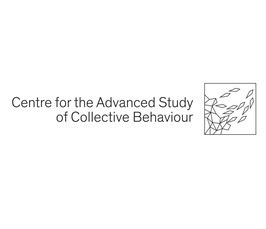CASCB talk: Brain-wide mapping of auditory-evoked responses in the small, transparent teleost fish, Jörg Henninger
- Date: May 2, 2022
- Time: 11:45 AM - 12:45 PM (Local Time Germany)
- Speaker: Jörg Henninger
- Jörg Henninger, Charité Berlin
- Location: ZT 702 and Online
- Room: ZT 702
- Host: Centre for the Advanced Study of Collective Behaviour

- Meeting-ID: 950 9854 6920
- Kenncode: 437219
Our understanding of how auditory information is transformed along the auditory pathway is still limited and would greatly benefit from dense recordings of neuronal population activity across brain areas. Yet, the size and opacity of vertebrate brains make it technically challenging to monitor brain-wide activity at a temporally and spatially high resolution. To fill this gap, my colleagues and I recently introduced a novel model organism, the teleost fish Danionella cerebrum. Danionella combines small size, genetic tractability, and brain transparency with the complexity of a mature vertebrate and thereby enables new ways to explore distributed neuronal circuits. At the same time our data show that Dc exhibit complex behaviours including acoustic communication. Here, we developed a custom-tailored microscope (image transfer oblique plane microscope, ITOPM) to enable the recording of quasi-synchronous neural activity across the majority of the Danionella brain with single-cell resolution at 1 Hz volume rate during auditory stimulation. Using whole-brain oblique plane microscopy we identify Danionella's major auditory processing areas spanning hindbrain, midbrain and forebrain. Our data demonstrates that the acoustic processing of pure tones and pulses is already segregated at the level of the acoustic nuclei in the hindbrain. Finally, we show how tuning specificity and sensitivity of cells increases with the transition from hindbrain to midbrain and how reponses to vocalisation mimics systematically vary along the whole acoustic pathway.
Jörg studied Biology with focus on experimental and computational neurobiology in Tübingen and Berlin. For his PhD with Prof. Jan Benda (Tübingen University), he developed and applied new technology for tracking and quantifying the natural stimulus space of weakly electric fish communication in the field. During his post-doctoral research with Prof. Benjamin Judkewitz (Charit Berlin), he introduced a novel model organism into neuroscience, the transparent, vocalizing teleost fish, Danionella cerebrum and employs it for studying auditory transformations across the whole Danionella brain. His future plans are to study fundamental phenomena of auditory perception, such as sound segregation, learning, and recognition.